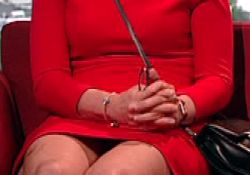 Dr Clare Gerada, the well-known suicide cyclist, and Chair for the time being of the Royal College of General Practitioners, appeared on the SuperMarr show this morning. She was in fiery mood, with short cut red hair and a dress so red that it might itself have been on fire. Beside her, Mr Stephen Dorrell MP, one-time Health Secretary in the Major government, smouldered in a grey brown wood-ash jacket. When Clare appeared on the verge of bursting into flames, Stephen puffed political smoke. Had a mirror been at hand, he would no doubt have flashed political semaphore too. For all Dr No knows, he may even have done so, but Dr No’s Sunday sensibilities had at the start been rudely corrupted, and his eyes fixed, by a rogue cameraman who had spotted the stage was set not for the SuperMarr show but for Basic Instinct III. The camera lingered hopefully. At one point, Clare raised her hands from her lap. The cameraman’s basic instincts twitched palpably, his finger on zoom; but it wasn’t to be. The only flashes, were there to be any, would come from Stephen’s mirror, or the dying embers in his wood-ash jacket. We were back on easy, like Sunday morning.
Dr Clare Gerada, the well-known suicide cyclist, and Chair for the time being of the Royal College of General Practitioners, appeared on the SuperMarr show this morning. She was in fiery mood, with short cut red hair and a dress so red that it might itself have been on fire. Beside her, Mr Stephen Dorrell MP, one-time Health Secretary in the Major government, smouldered in a grey brown wood-ash jacket. When Clare appeared on the verge of bursting into flames, Stephen puffed political smoke. Had a mirror been at hand, he would no doubt have flashed political semaphore too. For all Dr No knows, he may even have done so, but Dr No’s Sunday sensibilities had at the start been rudely corrupted, and his eyes fixed, by a rogue cameraman who had spotted the stage was set not for the SuperMarr show but for Basic Instinct III. The camera lingered hopefully. At one point, Clare raised her hands from her lap. The cameraman’s basic instincts twitched palpably, his finger on zoom; but it wasn’t to be. The only flashes, were there to be any, would come from Stephen’s mirror, or the dying embers in his wood-ash jacket. We were back on easy, like Sunday morning.
Which was as well, because Dr Gerada is a welcome medical voice on the many and serious flaws contained within the Tories’ Health and Social Care Bill. Unlike her predecessor at the Royal College, whose closest approach to fiery was to fan the flames under his MBE pot, Gerada has identified the four horsemen of the NHS apocalypse that ride within the Bill, and not only named them, but done her best to set fire to them.
While the Minister for Bureauscepticism and Rhetoric Set in Aspic puffed on about integrated care (whatever that is), refocusing on patients (let’s not forget it is the Bill – his party’s Bill – which takes the focus off patients and onto competition), no change is not an option (not that one again), and – bizarrely – ‘knitting together silos’, Gerada stuck to her guns and fired the four necessary salvos at the four horsemen:
1. The Secretary of State’s duty to provide a comprehensive health service must be retained
2. Competition must not in any shape or form drive our health service
3. NHS resources must remain in the NHS, and not be used to line third party pockets
4. The means to change, where change is needed, must be through collaboration and cooperation.
Gerada shows, in this clear back-of-the-envelope summary of what is wrong with Bill, and what needs to be done about it, that her basic instincts are firmly in the right place. But furthermore, between the lines, in the underpinning, she goes further than that. She reminds us that good doctors have no truck with competition, meaningless choice, or change for change’s sake. On the contrary, the good doctor’s basic instincts lie naturally with comprehensiveness, collaboration and cooperation – and, left to their own devices, unfettered by the iron chains of an unneeded Bill, those ancient basic medical instincts will naturally propel the health service towards the best that it can be.
